It’s 2 AM and you’re still scrolling through your phone, fully aware you have an early meeting tomorrow. You tell yourself “just five more minutes,” but an hour passes before you know it. This common scenario has a name: revenge bedtime procrastination, where people deliberately delay sleep to reclaim personal time they felt was lost during busy days.

This behavior stems from feeling like you lack control during the day, so your brain seeks autonomy at night – even at the expense of essential rest. Revenge bedtime procrastination affects helpers and caregivers[1] particularly often, as they spend most of their time focused on others’ needs rather than their own.
The cycle might feel satisfying in the moment, but it creates serious problems. Poor sleep affects your mood, health, and productivity the next day. Breaking this pattern requires understanding why it happens and using specific strategies to reclaim daytime hours for yourself while protecting your sleep.
Key Takeaways
- Revenge bedtime procrastination happens when people stay up late to reclaim personal time they feel they lost during busy days
- The behavior is manageable with awareness and intentional changes[2] like scheduling “me time” during the day and setting technology boundaries
- Breaking the cycle requires both protecting your bedtime and reducing daytime stress through better time management and self-care routines
Understanding Revenge Bedtime Procrastination
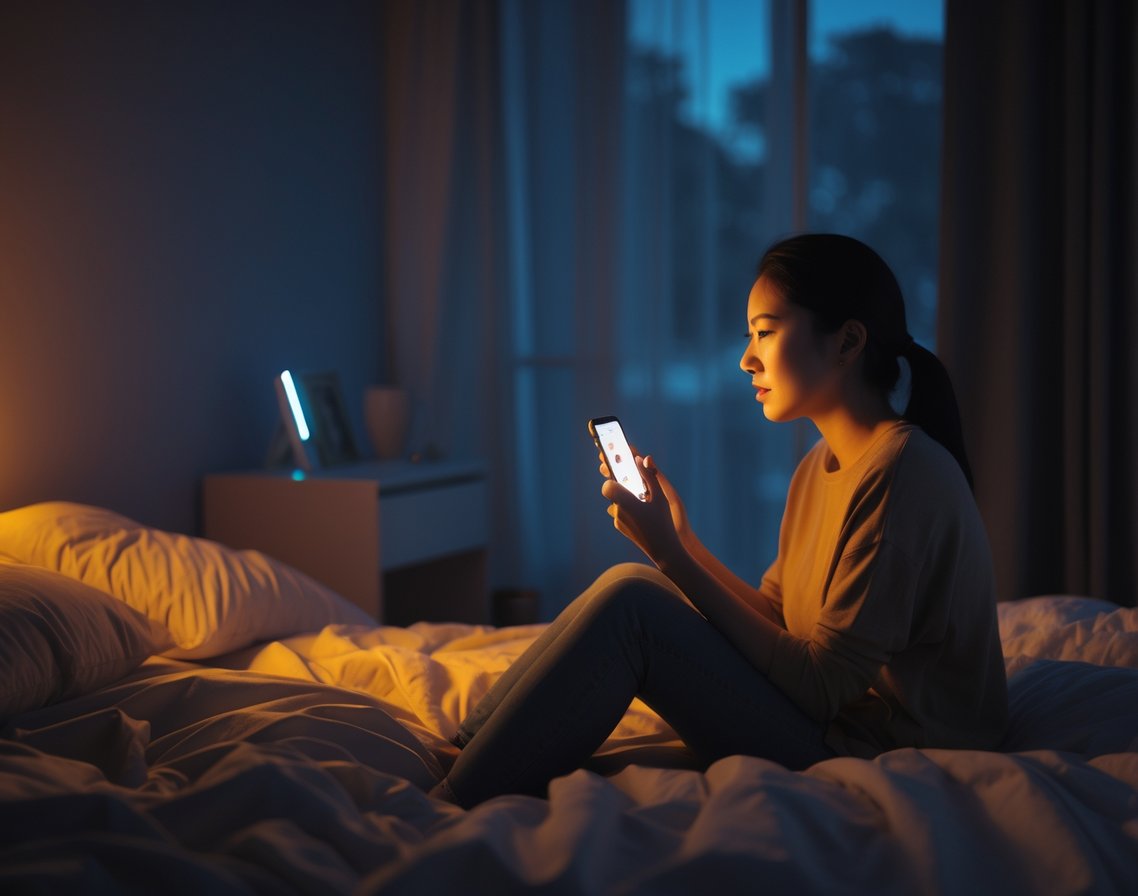
This specific form of sleep procrastination[3] differs from regular bedtime delays because it stems from a desire to reclaim personal time. People engage in this behavior as a way to feel more control over their daily schedule.
What Is Revenge Bedtime Procrastination?
Revenge bedtime procrastination happens when people delay sleep[4] to scroll social media, read, or play games. They stay up late even when they know they need sleep.
The behavior gets its name because it feels like getting back at a busy schedule. People who feel they had no free time during the day use nighttime hours for themselves.
Key characteristics include:
- Staying up late without external reasons
- Choosing entertainment over sleep
- Feeling like daytime offered no personal time
- Knowing the behavior will cause tiredness the next day
This type of bedtime procrastination reflects a deep human need for control[2] and personal time. The person trades sleep for activities they enjoy or find relaxing.
Most people who do this feel their daytime hours belong to work, family, or other obligations. Nighttime becomes their only chance for “me time.”
Origins and Prevalence
Revenge bedtime procrastination was first named in 2020[5]. The term became popular as more people recognized this pattern in their own sleep habits.
The concept originally came from discussions about work-life balance in busy societies. Long work hours and packed schedules leave little time for personal activities.
Common groups affected include:
- Working parents with young children
- People with demanding jobs or long commutes
- Students balancing school and work
- Caregivers managing others’ needs
The behavior became more noticeable during remote work periods. People found it easier to stay up late when they could sleep in or work from home.
Research shows this pattern is especially common in cultures with long working hours. The less control people feel over their daytime schedule, the more likely they are to delay bedtime.
Revenge Bedtime Procrastination vs. General Bedtime Procrastination
Regular bedtime procrastination involves delaying sleep for various reasons. Revenge sleep procrastination has a specific motivation[5] – reclaiming personal time.
Key differences:
| Revenge Bedtime Procrastination | General Bedtime Procrastination |
|---|---|
| Driven by need for personal time | Various reasons like anxiety or habit |
| Feels intentional and justified | Often feels like poor self-control |
| Related to busy daytime schedule | May happen regardless of daily routine |
| Activities are chosen for enjoyment | May involve mindless scrolling or worry |
General sleep procrastination[4] might happen because someone feels anxious about tomorrow or simply has poor sleep habits. The person may want to sleep but struggles to do so.
Revenge bedtime procrastination involves actively choosing late-night activities over sleep. The person knows they should sleep but deliberately stays awake for personal time.
Both types can harm sleep quality and next-day functioning. However, revenge bedtime procrastination often feels more purposeful to the person doing it.
Psychological Drivers and Root Causes

Revenge bedtime procrastination stems from a feeling of losing control over daily life[2] and depleted mental resources. People delay sleep as a way to cope with stress and reclaim the personal time they feel was taken from them during busy days.
Loss of Control and Autonomy
Modern life often leaves people feeling like passengers in their own schedules. Work demands, family responsibilities, and social obligations fill most waking hours. People struggle to find moments where they can make choices purely for themselves.
The brain craves moments where it can exert control[2], even when that choice harms long-term health. Staying up late becomes an act of rebellion against a structured day.
This need for autonomy runs deep. When someone cannot control their daytime schedule, nighttime becomes their only chance to feel powerful. They choose what to watch, read, or scroll through without anyone else deciding for them.
The irony is clear: people sacrifice tomorrow’s energy to feel in control today. This trade-off feels worth it in the moment because it satisfies a basic human need for freedom.
The Role of Self-Control and Ego Depletion
Self-control works like a muscle that gets tired throughout the day. Every decision, task, and responsibility uses up mental energy. By evening, people have less willpower left to make healthy choices.
This concept explains why someone can eat well and work productively all day, then struggle to go to bed on time. Their self-control reserves are simply empty.
Daily activities that drain self-control include:
- Making work decisions
- Managing emotions during stress
- Resisting food cravings
- Dealing with difficult people
- Focusing on boring tasks
When self-control runs low, the brain seeks immediate rewards instead of long-term benefits. A funny video or interesting article feels more appealing than the delayed reward of feeling rested tomorrow.
This depletion makes it harder to resist the pull of phones, streaming services, and other distractions that keep people awake.
Coping Mechanisms and The Need for Personal Time
Staying up late becomes a coping mechanism for dealing with stress and lack of personal time[6]. People use nighttime hours to process emotions, unwind, and engage in activities they enjoy.
Me-time feels essential for mental health. When daytime hours offer no space for personal interests, people create that space by staying awake longer. They read books, watch shows, or chat with friends online.
This coping mechanism provides temporary relief but creates new problems. Poor sleep leads to more stress the next day, which increases the need for nighttime escape.
Common nighttime activities people use to cope:
- Social media scrolling
- Watching TV shows or movies
- Reading books or articles
- Playing mobile games
- Online shopping
The cycle continues because the root problem remains unsolved. Without adequate personal time during the day, people will keep stealing it from their sleep hours as a way to maintain their mental well-being.
Contributing Factors in Modern Life
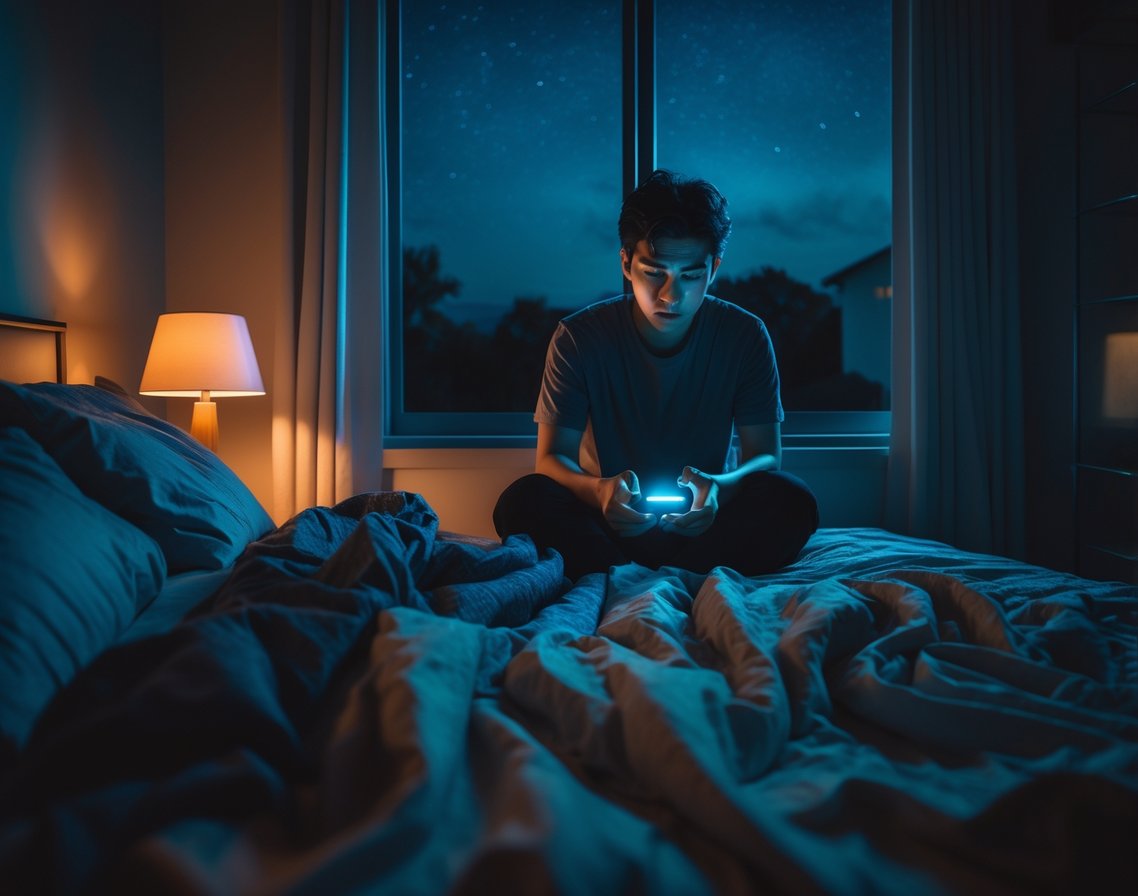
Several key aspects of today’s lifestyle make revenge bedtime procrastination more common. Digital devices, packed schedules, and blurred work-life boundaries create perfect conditions for people to delay sleep.
Technology and Screen Time
Technology can exacerbate this sleep problem[7] by making it easy to lose track of time. People often tell themselves they’ll watch just one more episode or scroll for ten more minutes.
The blue light from phones, tablets, and computers tricks the brain into staying alert. This makes falling asleep harder even when someone finally puts their device down.
Common screen time behaviors that delay sleep:
- Checking social media feeds repeatedly
- Watching streaming shows late into the night
- Playing mobile games for hours
- Reading news or articles on devices
Notifications and alerts pull attention away from a proper bedtime routine. Many people keep their phones next to their bed, making it tempting to pick them up.
The endless nature of digital content means there’s always something new to see. Apps and websites are designed to keep users engaged for as long as possible.
Overscheduled Lifestyles
Modern life often leaves little room for personal time during waking hours. People pack their days with work, family duties, household tasks, and social obligations.
When bedtime arrives, it feels like the first chance to do something enjoyable. This creates a strong urge to stay awake and claim some personal time.
Typical daily schedule pressures:
- Long work hours with little flexibility
- Commuting time that cuts into personal time
- Family responsibilities and childcare
- Household maintenance and chores
- Medical appointments and errands
The feeling of not having enough “me time” drives people to steal hours from their sleep routine. They view staying up late as the only way to have control over their schedule.
Busy lifestyles also make it hard to wind down properly. People jump straight from high-stress activities to trying to sleep without a proper transition.
Lack of Boundaries Between Work and Home
Remote work and always-connected devices have blurred the lines between work time and personal time. Many people check work emails or take calls well into the evening.
This constant work availability makes it harder to create clear boundaries around a sleep routine. The workday never truly ends, leaving people feeling like they haven’t had real downtime.
Ways work intrudes on evening hours:
- Late-night emails and messages
- Working from home without set hours
- Taking calls during family time
- Bringing work stress into the bedroom
Without clear separation between work and rest, people struggle to shift into sleep mode. Their minds remain active and focused on work problems instead of relaxing.
The pressure to be constantly available creates anxiety about missing important communications. This leads some people to check their phones repeatedly before bed, disrupting their bedtime routine.
Consequences of Revenge Bedtime Procrastination
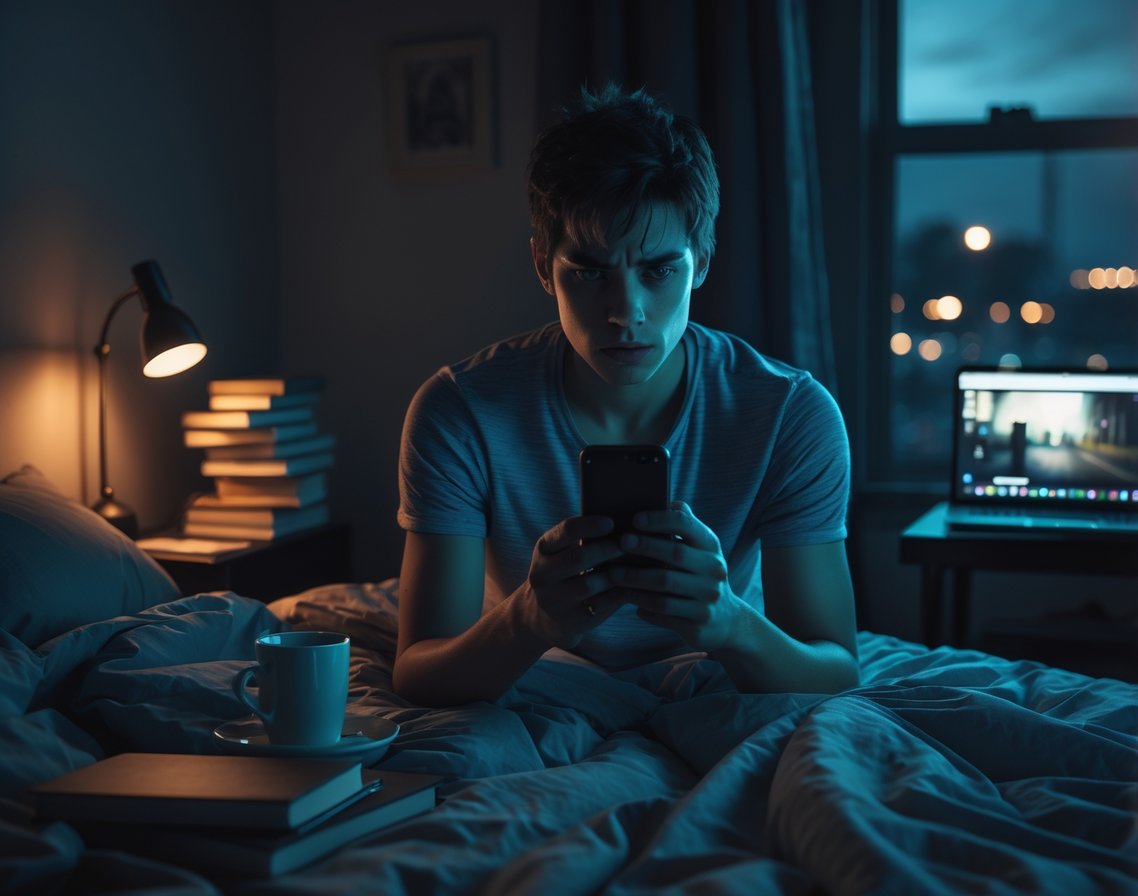
Staying up late to reclaim personal time[4] creates a chain of negative health effects. People who practice revenge bedtime procrastination face immediate sleep loss and long-term damage to their mental and physical well-being.
Sleep Deprivation and Insufficient Sleep
Revenge bedtime procrastination directly causes sleep deprivation. Most adults need 7-9 hours of sleep each night to function properly.
When people delay bedtime by 1-3 hours for personal activities, they rarely adjust their wake-up times. This creates an immediate sleep deficit.
Immediate effects of insufficient sleep include:
- Difficulty concentrating the next day
- Slower reaction times
- Memory problems
- Increased irritability
Chronic sleep deprivation develops when this pattern continues for weeks or months. The body cannot recover from repeated nights of poor sleep.
Sleep debt accumulates over time. Missing 2 hours of sleep each night for a week equals losing an entire night’s rest. This debt cannot be fully repaid with weekend sleep-ins.
People often underestimate how much their delayed bedtime affects their daily performance. Even mild sleep loss of 1-2 hours can reduce cognitive abilities by 20-30%.
Impact on Mental Health
Sleep deprivation from procrastination harms emotional regulation[8]. Insufficient sleep makes it harder for people to manage stress and emotions effectively.
Mental health consequences include:
- Increased anxiety levels
- Higher risk of depression
- Mood swings and irritability
- Difficulty making decisions
- Reduced ability to cope with daily stress
Sleep loss affects the brain’s emotional centers. The amygdala becomes more reactive to negative events when people are tired. This makes small problems feel overwhelming.
Chronic sleep deprivation can worsen existing mental health conditions. People with anxiety or depression may experience more severe symptoms when they consistently lose sleep.
The irony is clear: people stay up late to feel better, but this behavior ultimately makes them feel worse. The temporary satisfaction of “me time” cannot offset the mental health costs of lost sleep.
Long-Term Physical Health Risks
Chronic sleep deprivation from revenge bedtime procrastination damages physical health over time. The body needs sleep to repair tissues and maintain immune function.
Heart health suffers significantly from poor sleep habits. People who regularly sleep less than 6 hours per night have a 48% higher risk of heart disease. Blood pressure increases when sleep is consistently inadequate.
Sleep loss also affects metabolism and weight control. Insufficient sleep disrupts hormones that control hunger and fullness. This leads to increased appetite and potential weight gain.
Long-term physical risks include:
- Weakened immune system
- Higher diabetes risk
- Increased inflammation
- Faster aging process
- Greater injury risk
The cardiovascular system particularly suffers from chronic sleep loss. Heart rate and blood pressure remain elevated when the body cannot fully rest and recover each night.
These physical consequences develop gradually but can become permanent if sleep patterns do not improve.
Breaking the Cycle: Effective Strategies
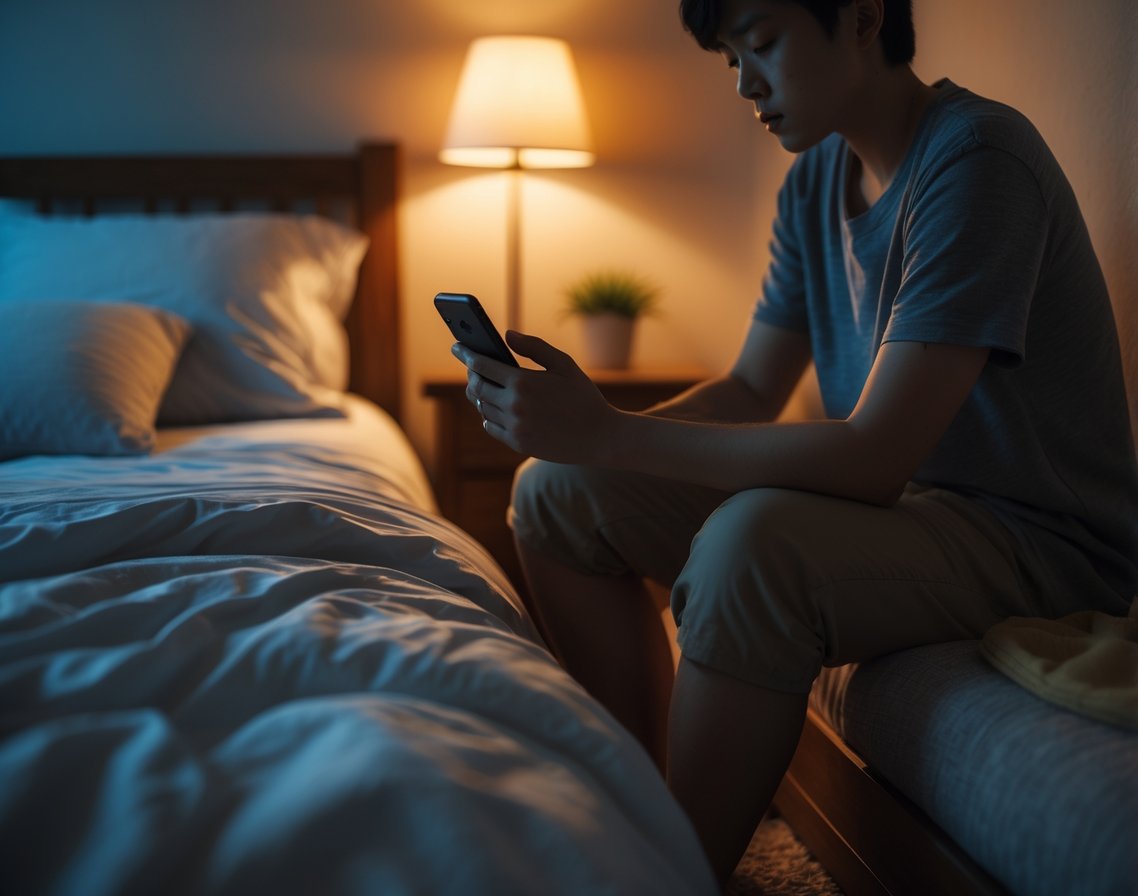
Breaking free from revenge bedtime procrastination requires establishing healthy boundaries[7] around personal time and creating consistent sleep habits. The most successful approaches combine realistic time management with compassionate self-care practices.
Setting Realistic Boundaries for Personal Time
People need to identify when they can realistically carve out personal time during the day. This prevents the desperate need to steal hours from sleep.
Schedule dedicated downtime during daylight hours, even if it’s just 15-30 minutes. This could include reading, listening to music, or taking a short walk. The key is making it non-negotiable.
Set a technology curfew at least one hour before the desired bedtime. Limiting screen time[7] prevents the endless scrolling that keeps people awake.
Create clear work boundaries by establishing specific end times for work-related activities. This includes checking emails, finishing projects, or taking work calls.
Weekend boundaries are equally important. People should protect some weekend time for relaxation rather than filling every moment with obligations or chores.
Establishing a Consistent Bedtime Routine
A structured bedtime routine signals to the body that it’s time to wind down. Creating a routine and sticking to it[7] is one of the most important steps for healthy sleep habits.
Start the routine 30-60 minutes before bedtime. This gives the mind time to transition from daily stress to sleep mode.
Effective pre-sleep activities include:
- Reading a book
- Taking a warm shower or bath
- Light stretching or gentle yoga
- Writing in a journal
- Listening to calming music
Avoid stimulating activities like intense exercise, heavy meals, or caffeine after lunch. These can interfere with the body’s natural sleep preparation.
Keep the bedroom environment conducive to sleep by making it quiet, dark, and slightly cool[7]. Consider blackout curtains or a white noise machine if needed.
Promoting Self-Compassion and Self-Care
Self-compassion plays a crucial role in breaking the revenge bedtime cycle. Many people stay up late because they feel guilty about not having enough personal time.
Recognize that rest is productive. Sleep isn’t lazy or selfish – it’s essential for physical and mental health. Adults need seven to eight hours of sleep each night.
Practice self-forgiveness when slip-ups occur. One late night doesn’t mean failure. The goal is progress, not perfection.
Reframe personal time as something that can happen throughout the day in small chunks rather than only late at night. Five minutes of deep breathing or enjoying a cup of tea counts as self-care.
Address underlying anxiety or stress that might be driving the need to stay up late. If worrying thoughts keep someone awake, consider writing them down earlier in the day or talking to a counselor.
Self-care includes saying no to excessive commitments that leave no time for rest or relaxation during normal hours.
Building a Sustainable Sleep Routine
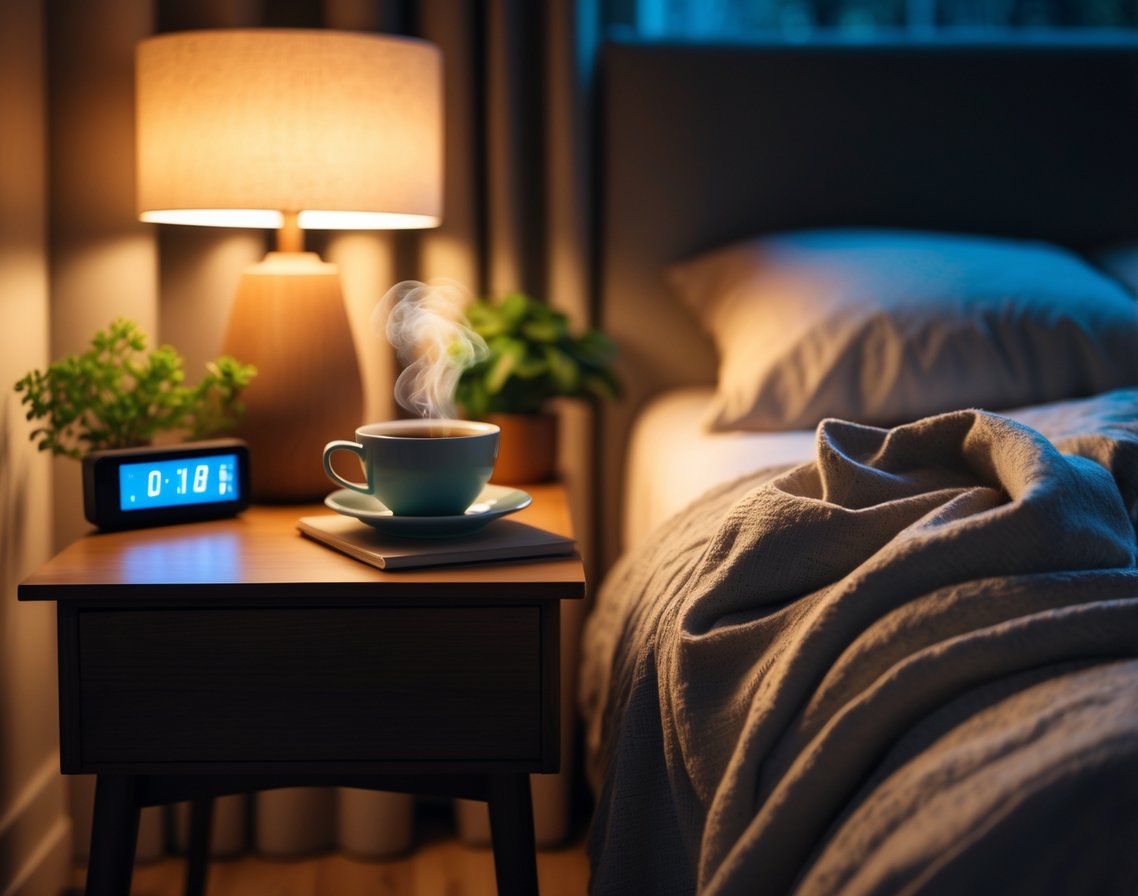
A consistent sleep routine forms the foundation for overcoming revenge bedtime procrastination. The right environment, reduced technology exposure, and calming pre-sleep activities work together to make bedtime more appealing than late-night scrolling.
Creating a Sleep-Friendly Environment
The bedroom environment plays a crucial role in breaking the cycle of delayed sleep. Experts recommend making bedrooms quiet, dark, and cool[7] to promote better rest.
Temperature Control
- Keep the room between 60-67°F (15-19°C)
- Use fans or air conditioning as needed
- Choose breathable bedding materials
Light Management Darkness signals the brain to produce melatonin. Install blackout curtains or use eye masks to block external light sources.
Sound Reduction White noise machines can mask disruptive sounds. Earplugs offer another option for noise control. Consider the following sound solutions:
| Sound Issue | Solution |
|---|---|
| Traffic noise | White noise machine |
| Neighbor sounds | Earplugs |
| Partner snoring | Separate sleep spaces |
Comfort Elements Invest in quality mattresses and pillows that support proper sleep posture. Remove work materials and electronic devices from the sleeping area.
Limiting Technology Before Bed
Technology use often drives revenge bedtime procrastination behaviors. Setting a technology curfew about one hour before bed[7] helps break the late-night scrolling habit.
Device Management Charge phones and tablets outside the bedroom. This removes the temptation to check notifications or browse social media when trying to sleep.
Blue Light Reduction Blue light from screens interferes with natural sleep hormones. Use blue light blocking glasses or enable night mode on devices during evening hours.
Alternative Activities Replace screen time with calming activities. Read physical books, practice gentle stretches, or listen to audiobooks without visual screens.
Notification Control Turn off non-essential notifications after dinner time. Silence devices to avoid distractions from vibrations or beeps[7] that might trigger late-night phone checking.
Integrating Relaxing Pre-Sleep Activities
A structured bedtime routine signals the body that sleep time approaches. Healthy bedtime routines may include reading, journaling, warm showers, or light stretching[7] instead of stimulating activities.
Physical Relaxation
- Take warm baths or showers to lower body temperature
- Practice gentle yoga or stretching exercises
- Use progressive muscle relaxation techniques
Mental Wind-Down Journaling helps process daily thoughts and concerns. Write down tomorrow’s tasks to clear mental clutter before sleep.
Timing Consistency Start the bedtime routine at the same time each night. This builds automatic habits that make sleep feel more natural than staying awake.
Duration Planning Allow 30-60 minutes for pre-sleep activities. Rushing through a bedtime routine reduces its effectiveness for promoting relaxation and sleep readiness.
When to Seek Professional Help
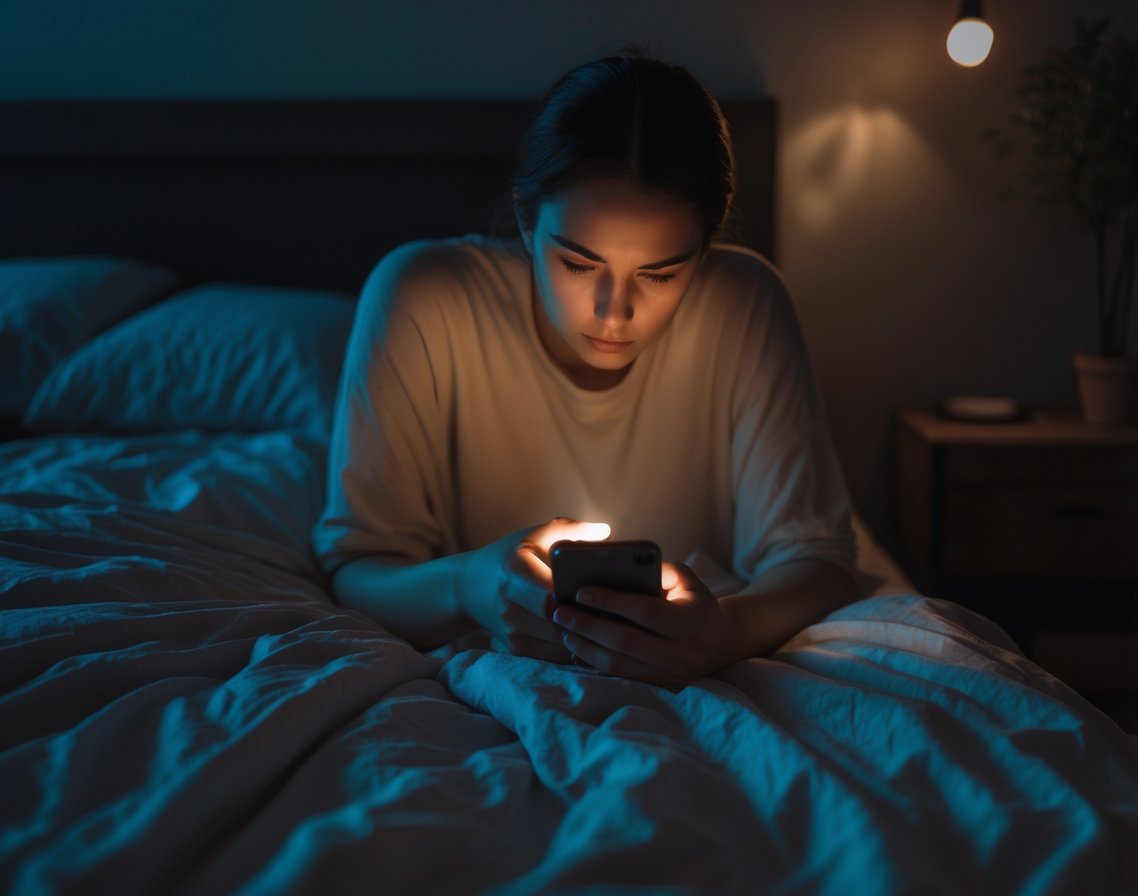
Some people need expert help to break free from revenge bedtime procrastination, especially when sleep problems become severe or affect daily life. Mental health professionals can provide tools and treatments that go beyond basic sleep hygiene.
Recognizing Signs of Insomnia or Severe Sleep Issues
Revenge bedtime procrastination can develop into insomnia[9] if the pattern continues for weeks or months. People should watch for warning signs that indicate professional help is needed.
Key warning signs include:
- Taking more than 30 minutes to fall asleep most nights
- Waking up multiple times during the night
- Feeling exhausted all day despite being in bed for 7-8 hours
- Using alcohol or sleep aids to fall asleep regularly
Sleep problems become medical concerns when they last more than three weeks. People who feel tired all day but still cannot make themselves go to bed at reasonable times need professional evaluation.
Physical symptoms like headaches, stomach problems, or getting sick often can signal that sleep loss is harming health. Mental symptoms include mood swings, memory problems, or difficulty concentrating at work or school.
Anyone who has tried multiple strategies for several weeks without success should contact their doctor. Sleep specialists can identify underlying conditions that make breaking the cycle harder.
The Role of Mental Health Professionals
Mental health professionals help people understand the deeper reasons behind their sleep-delaying behaviors. Therapists can teach coping skills that address the root causes instead of just the symptoms.
Types of professional help available:
- Cognitive Behavioral Therapy (CBT) – Changes thought patterns about sleep and personal time
- Sleep specialists – Medical doctors who treat sleep disorders
- Psychiatrists – Can prescribe medications if needed for underlying conditions
A psychiatrist might recommend medication for anxiety or depression that makes falling asleep difficult. These conditions often fuel the need to stay awake seeking control or comfort.
Therapists help people find better ways to get personal time during the day. They teach stress management techniques that reduce the urge to “steal” time at night.
Group therapy or support groups connect people with others facing similar struggles. Sharing experiences helps people feel less alone in their sleep challenges.
Sustaining Healthy Habits for Long-Term Change
Professional help provides structure and accountability that many people need for lasting change. Regular appointments create external motivation when willpower alone is not enough.
Mental health professionals help people identify their personal triggers. Some people procrastinate sleep when work stress increases, while others do it during relationship problems or major life changes.
Long-term strategies professionals teach:
- Setting up reward systems for good sleep habits
- Creating backup plans for difficult nights
- Building support networks with family and friends
- Developing healthy ways to handle stress and emotions
Professionals help people set realistic goals instead of trying to change everything at once. Small, gradual changes are more likely to stick than dramatic shifts in bedtime.
They also teach relapse prevention skills. Most people have setbacks when building new habits, and professionals help people get back on track quickly instead of giving up completely.
Regular check-ins with a therapist or counselor provide ongoing support as people face new life challenges that might trigger old patterns.
Improving Daytime Productivity and Well-Being

Better sleep creates a direct path to higher productivity and stronger self-care habits. When people address their sleep patterns, they can build more energy for work tasks and create time for personal needs during regular hours.
Boosting Productivity Through Better Sleep
Getting enough sleep makes the brain work faster and better. Sleep deprivation leads to brain stress and cloudy thinking[10], which slows down work performance.
Well-rested workers finish tasks quicker. They make fewer mistakes and remember important details better. Their focus stays sharp throughout the day.
Key productivity benefits of good sleep:
- Faster problem-solving
- Better memory recall
- Stronger attention span
- Clearer decision-making
Poor sleep creates a cycle that hurts work performance. Tired workers take longer to complete projects. They need more time to fix errors and often miss deadlines.
Research shows that ample sleep helps people respond better to both negative and positive workplace situations[10]. This means less stress and better teamwork.
Finding Balance with Personal and Professional Responsibilities
Creating time for self-care during the day stops the need to steal time at night. Scheduling 15-30 minutes of “me time” during the day[10] reduces the urge to stay up late.
Simple daytime self-care activities:
- Taking short walks
- Eating lunch away from the desk
- Listening to music
- Reading a few pages of a book
People need to protect their personal time like they protect work meetings. They should put self-care activities on their calendars and treat them as important appointments.
Breaking free from revenge bedtime procrastination requires strategic stress management[11]. This means handling work pressure during work hours instead of carrying it home.
Setting clear work boundaries helps create space for personal needs. When work stays at work, evenings become available for relaxation and proper sleep preparation.
Frequently Asked Questions
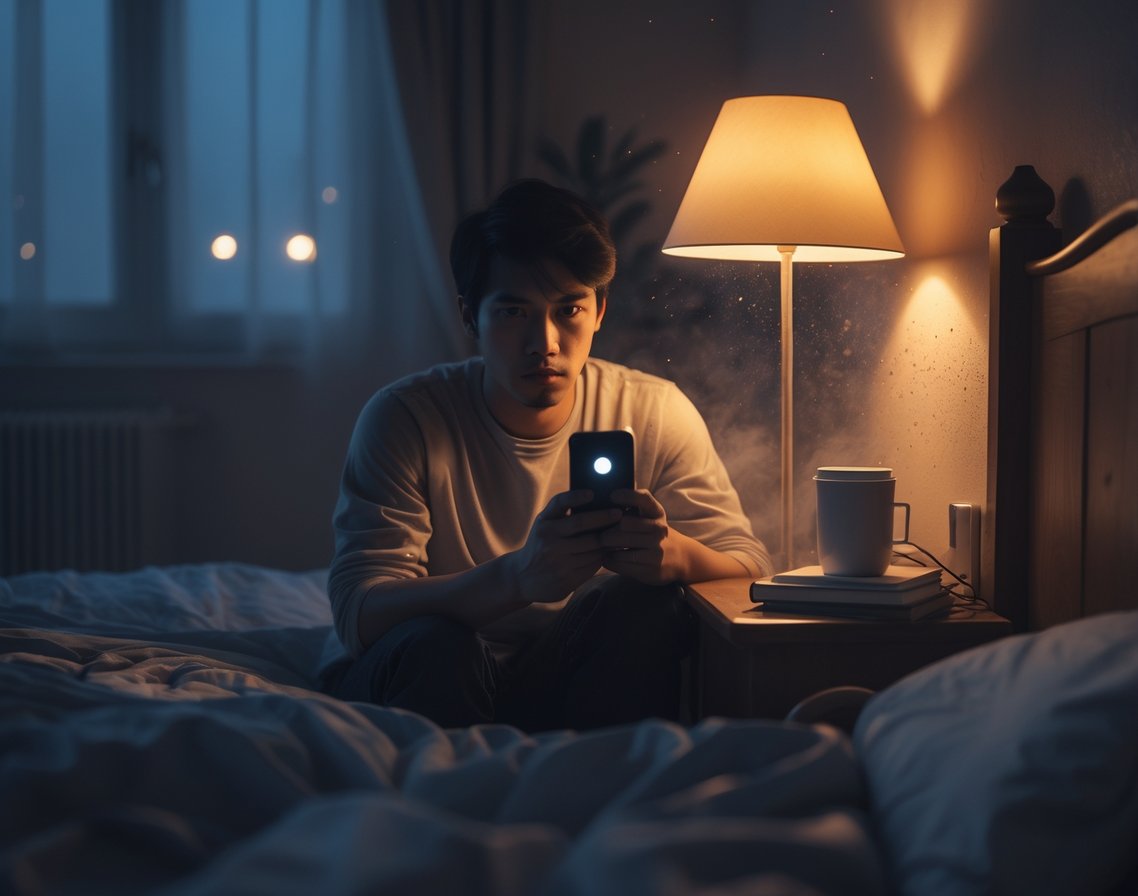
Breaking bedtime procrastination requires specific strategies that address both behavioral patterns and environmental factors. Understanding the psychological drivers and practical solutions helps people reclaim control over their sleep schedules.
What strategies can help in overcoming bedtime procrastination?
Establishing a consistent bedtime routine[7] helps break the cycle of staying up late. This includes activities like reading, journaling, or light stretching instead of screen time.
Setting a technology curfew one hour before bed prevents endless scrolling. People should charge devices away from their bedroom to avoid temptation from notifications and alerts.
Creating boundaries around personal time during the day reduces the need to steal time from sleep. Scheduling specific periods for relaxation and hobbies prevents the feeling of missing out on personal activities.
Is there a psychological basis for bedtime procrastination?
Revenge bedtime procrastination gives people a sense of control over their schedule[7] after busy, demanding days. The behavior stems from feeling like there isn’t enough personal time between work and sleep.
Some people delay bedtime to avoid anxiety or restless feelings. Working through these emotions during daytime hours prevents them from interfering with sleep schedules.
The desire for autonomy drives this behavior when people feel their daytime hours are controlled by others. Late-night hours become the only time that feels truly personal.
What role does screen time play in contributing to bedtime procrastination?
Technology can make sleep problems worse[7] by encouraging endless scrolling or binge-watching. The “just one more episode” mentality keeps people awake far past their intended bedtime.
Blue light from screens interferes with natural sleep hormones. This makes it harder to feel tired even when the body needs rest.
Social media algorithms are designed to keep users engaged. This creates a cycle where people intend to spend a few minutes online but end up scrolling for hours.
How can individuals with ADHD manage bedtime procrastination effectively?
People with ADHD often struggle with time awareness and impulse control at bedtime. Setting multiple alarms throughout the evening helps create awareness of approaching sleep time.
Visual cues like dimming lights or setting out pajamas can serve as reminders to start the bedtime routine. These external signals help compensate for internal time management challenges.
Breaking the bedtime routine into smaller, specific steps makes it less overwhelming. Writing down each step or using apps to track progress provides structure and accountability.
Are there any cultural factors that influence bedtime procrastination behaviors?
Work cultures that glorify long hours and constant availability contribute to bedtime procrastination. People in these environments often feel their only free time occurs late at night.
Cultural emphasis on productivity can make relaxation feel guilty or wasteful. This leads people to stay up late as their only acceptable form of personal time.
Different cultural attitudes toward sleep affect how seriously people take their bedtime routines. Some cultures view sleep as essential while others see it as less important than work or social activities.
Can implementing a sleep routine mitigate the effects of bedtime procrastination?
Creating and sticking to a consistent routine[7] is one of the most effective ways to build healthy sleep habits. This includes both bedtime and wake-up times.
A proper sleep environment supports routine adherence. Keeping bedrooms quiet, dark, and slightly cool[7] promotes better rest and makes bedtime more appealing.
Avoiding caffeine after lunch and large meals in the evening prepares the body for sleep. These dietary changes support the routine by making it easier to fall asleep on schedule.
References
- Breaking the Cycle of Revenge Bedtime Procrastination — Mezzo Solutions. https://www.mezzosolutions.com/helpers-guidepost/breaking-the-cycle-of-revenge-bedtime-procrastination Accessed November 9, 2025
- Revenge Bedtime Procrastination and 4 Ways to Break It. https://psychuniverse.com/revenge-bedtime-procrastination/ Accessed November 9, 2025
- Revenge Bedtime Procrastination: Why You Self-Sabotage at Night. https://www.sleepfoundation.org/sleep-hygiene/revenge-bedtime-procrastination Accessed November 9, 2025
- Revenge Bedtime Procrastination: What It Is and How to Overcome It. https://psychcentral.com/health/revenge-bedtime-procrastination Accessed November 9, 2025
- Revenge bedtime procrastination was first named in 2020. https://www.verywellhealth.com/revenge-bedtime-procrastination-11721723 Accessed November 9, 2025
- The Psychology Of Revenge Procrastination: Why We Do It And How To Stop. https://themindsjournal.com/readersblog/the-psychology-of-revenge-procrastination-why-we-do-it-and-how-to-stop/ Accessed November 9, 2025
- Technology can exacerbate this sleep problem. https://www.verywellhealth.com/revenge-bedtime-procrastination-11721823 Accessed November 9, 2025
- WordPress › Setup Configuration File. https://www.psychologs.com/revenge-bedtime-procrastination-why-we-delay-sleep-its-effects-and-how-to-overcome-it/ Accessed November 9, 2025
- What Is Revenge Bedtime Procrastination? How to Stop. https://amerisleep.com/blog/revenge-bedtime-procrastination/ Accessed November 9, 2025
- Revenge Bedtime Procrastination: 5 Tips To Identify And Prevent It. https://www.forbes.com/sites/bryanrobinson/2025/04/24/revenge-bedtime-procrastination-5-tips-to-identify-and-prevent-it/ Accessed November 9, 2025
- WordPress › Error. https://blainy.com/revenge-bedtime-procrastination/ Accessed November 9, 2025
